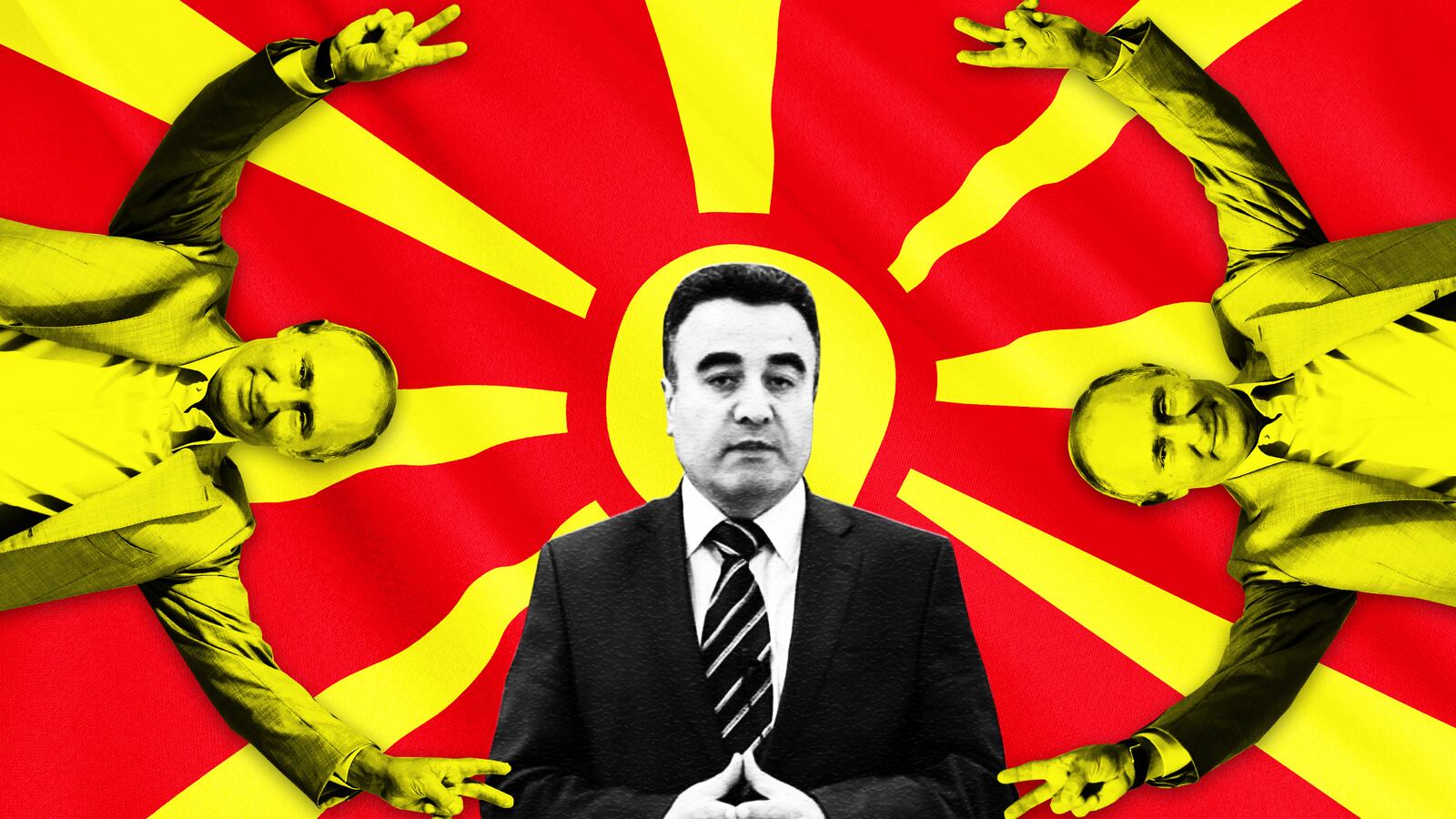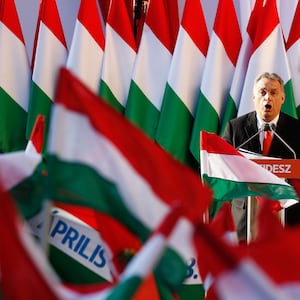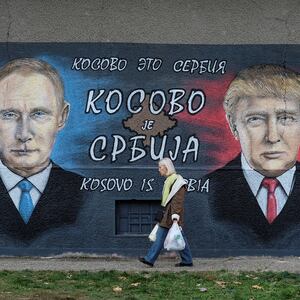SKOPJE, Macedonia—Janko Bachev is a former agent in Macedonia’s secret service who now leads this country’s increasingly powerful opposition, and he has modeled himself rather slavishly on Russian President Vladimir Putin: United Macedonia, his political party, emulates the Kremlin’s United Russia party to such an extent that its escutcheon bears the Russians’ motif and colors, but replaces the bear with a lion.
In Bachev’s poorly furnished offices here in the center of the Macedonian capital, pieces of carpet may be peeling off the stairs, but the Russian national flag proudly decorates a corner in the conference room. Call Bachev on his cell phone and you hear the Russian national anthem.
“Our future is with Putin’s Eurasian Union, a much more [propitious] alliance than NATO,” Bachev told The Daily Beast. He liked Russia, he said, for its Orthodox religion, for its traditional values, and he’s not worried when his critics accuse him of being “a Kremlin agent.”
On his recent visit to Moscow he strengthened ties with the Russian State Duma and when he came back home waved the Russian flag at pro-Putin demonstrations. He welcomes the Kremlin’s influence in the Balkans, and denounces what he sees as Western influence. “Skopje is full of Americans and Europeans putting pressure on our parliament, and our secret service is not stopping them!” he shouted, then added conspiratorially, “If the United States continues to drag Macedonia toward NATO, Putin will interfere and World War III will erupt in the Balkans.”
Both former KGB agent Putin and Macedonia’s secret agent Bachev developed their world views in the fear-filled atmosphere of the Cold War with its constant threat of blossoming mushroom clouds. And yet, a nuclear war is a part of their current populist speeches.
“Russia will use nuclear weapons only when it is convinced that a potential aggressor will attack it,” Putin said just before U.S. security adviser John Bolton’s recent visit to Moscow. “If we are victims of aggression, we will go to paradise as martyrs and they will simply die, without even having time to repent,” he said, hinting as always that the antecedent of “they” is America.
PUTIN CREATED THE EURASIAN UNION seven years ago, as an alternative to what he called the United States’ “pole of power.” In an article for Izvestia in 2011 Putin announced the creation of “a colossal market, that will encompass over 165 million consumers, with unified legislation and the free flow of capital, services and labor.”
So far, Putin has convinced only five states to join: Belarus, Kazakhstan, Kyrgyzstan and Armenia. Nonetheless, Moscow is working hard to undermine the U.S. policy of Western integration, striving to boost Russian power in Central Asia, and in the Balkans and Eastern Europe.
Among President Putin’s allies are Macedonia’s Bachev; Milorad Dodik, the leader of Republika Srpska; Serbian President Aleksandar Vucic; and Hungarian leader Victor Orban, who has made his country a disruptive member of the European Union and of NATO. They frequently travel to Moscow to receive Putin’s encouragement or to strike business deals.
Putin’s informal alt-right adviser Alexander Dugin visited Skopje in January. Dugin is the key ideologue of the pro-Kremlin rebellion in eastern Ukraine. Anybody who is interested in destabilizing a region in a few weeks should ask Dugin, he is an expert.
In his most recent “Directive” on YouTube, Dugin declared ominously, “Clouds grow thicker over this small Orthodox Slav country Macedonia—if anybody intends to blow up the Balkans once again, this is precisely the place to begin.” The new war would erupt “there or in neighboring Bosnia, where the situation is heating up more and more. And Russia is focusing now, which is giving us more optimism… Eastern Europe is falling into our hands all by itself—this is the time to create a league of Orthodox states,” Dugin said.
Even after seeing the wounds Ukraine has suffered to break free of the Kremlin’s influence during the Euro-Maidan revolution and the war in Donbas, even after Bulgaria and Montenegro joined NATO, pro-Kremlin powers in the Balkans have not given up asking for Putin’s support.
“Putin does not have any ideology to offer, he is trying to buy more allies with the money he has left,” Russian opposition leader Dmitry Gudkov told The Daily Beast.
Last month Serbian President Aleksandar Vucic traveled to Moscow to ask Putin to protect Serbian independence. The agenda included talks about the “growing tensions in the region,” the Kremlin’s spokesman Dmitry Peskov said. Several Serbian parties have signed cooperation agreements with United Russia. Milica Djurdjevic, leader of the Zavetnici party, told The Daily Beast that “the Balkans are a political priority for Moscow, now that Montenegro has joined NATO.”
EUROPEAN ANTI-ESTABLISHMENT POPULISTS play the Eurasian Union against the European Union, asking for more money from both. It’s a tricky game, and they should remember the Ukrainian leader Viktor Yanukovych overplayed that card. With one hand Yanukovych promised his people to integrate Ukraine into the European Union and with the other took $3.5 billion of loans from Putin, ignoring mass opposition protests against a “sell-out.” In 2014 he was forced to flee the country.
In spite of Bachev and other opposition leaders claiming that the West will strip away Macedonia’s history and identity, the Macedonian government pushed through a change to the country’s name, making it North Macedonia. They hoped to mollify the Greeks, who have their own Macedonian history and identity, and who otherwise would have blocked the country’s accession to NATO and the E.U. Meanwhile Athens, which traditionally has good relations with Moscow, expelled two Russian diplomats for undermining the national security of Greece.
Dugin insists that these setbacks in Russia’s great game are insignificant. “Greeks are our brothers, we’ll convince them to join [the Eurasian Union], since any hour now they might get pushed out of the European Union or quit the E.U. themselves, which would be the right thing to do,” he says.
The Eurasianists may have second thoughts if they take a closer look at Putin and his party: its popularity has melted down to 31 percent.
“The European Union means a progressive future, while the road to Eurasian Union is the road to the past, designed by former KGB agent Putin,” Gudkov told The Daily Beast. “The pro-Putin leaders choosing the Eurasian Union should be ready to become martyrs and go to paradise with us, since that is really the only destination Putin’s policy offers.”







